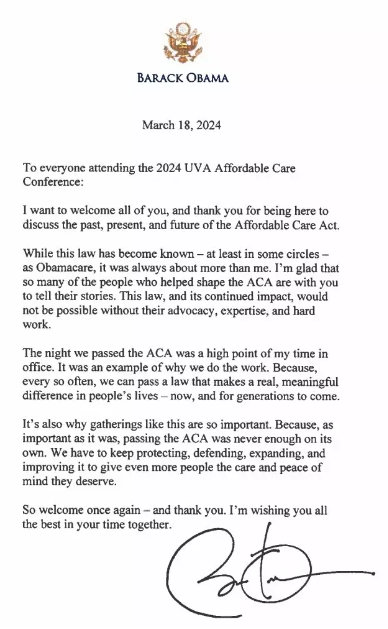
UVA Conference Examines Affordable Care Act 10 Years Later
By Josette Corazza
Ten years into the Affordable Care Act’s overhaul of American health care, Professor Margaret Foster Riley thought it was time for a wellness check.
The University of Virginia School of Law professor designed a semester-long course to build her students’ expertise on the law, and arranged for them to partner with the Darden Health Care Initiative to host an invitation-only two-day conference in March to examine the implementation of the reform.
“The combination of factors, as well as the interaction between law and business students — and faculty — has given them a unique opportunity to understand how a major piece of legislation was passed, implemented, defended and attacked,” Riley said. “They have come away from the experience with a deep understanding of the uniquely complex U.S. health care system.”

A letter from former President Barack Obama thanks conference participants.
In addition to the Law School and Darden, the Miller Center of Public Affairs and Jefferson Scholars Foundation also served as sponsors for the event, which drew 100 leaders and experts in health care, business, government and academia, as well as students from Darden, Law, the School of Nursing and the Frank Batten School of Leadership & Public Policy. Participants included key figures from the White House, Congress, the Centers for Medicare and Medicaid Services, Health and Human Services, and the health insurance and hospital industries. The conference was co-organized by Riley, Darden professor Vivian Riefberg and Miller Center professor Guian McKee.
The law’s passage had always involved a balancing of interests that made for “strange bedfellows” and that played out again at the conference, according to one of the students attending, Casey Crowley ’24.
“You had to put together all these groups that couldn’t stand to be in the same room together to get the act passed,” Crowley said. “Even at this conference, proponents of the ACA were arguing with each other about the benefits and drawbacks. There’s very little agreement in the area.”
The event may have been the first time many of the people who were involved in the passage and implementation of the ACA came together in an interactive context for a deep analysis of the ACA’s execution, Riley said.
The conference examined the passage and implementation of the ACA for lessons learned, explored where health care reform might go from here, and considered how to apply these lessons to other potential major government changes.
Participants agreed that information conveyed at the conference could be used, though not directly attributed. This encouraged participants to “willingly be remarkably open about what transpired and to share their thoughts about why things happened, what could have been done differently and what it might mean for the future,” Riley said. “We learned things during the conference that I haven’t seen described before.”
Riley’s course, Ten-Year Check-Up of the Affordable Care Act, designed to work in tandem with the conference, included both law and business students and began by building student expertise with the subject matter. By the class’s end, they were “full partners in the conference,” Riley said.
At the event, held at the Darden Sands Family Grounds in Rosslyn, Virginia, students had the opportunity to connect with various players in the passage and implementation of the ACA, as well as current health care leaders.
Since the conference’s close, students have been working on policy briefs related to health care reform.
The class and the conference have both stoked an interest in further analysis, Riley said, with conference participants asking whether a similar event would be held again in five years and students asking to engage in a post-mortem analysis of the conference’s findings.
Amelia Nell ’25 said that working with Darden students throughout the course of the class provided a different perspective.
“The law students thought of things through a more theoretical lens, while the business students thought of things more practically,” Nell said. “I think it’s important to consider both aspects, and it was interesting to see the two sides interact with each other.”
Despite the complexities and disagreements, the students expressed optimism about the future of health care reform.
“This is a field that has a lot of different stakeholders, but there is the interest in working together,” Nell said. “With health care, everyone knows someone who’s been a patient before. It seems to help align interests.”
This article originally appeared in UVA Law News.
The University of Virginia Darden School of Business prepares responsible global leaders through unparalleled transformational learning experiences. Darden’s graduate degree programs (MBA, MSBA and Ph.D.) and Executive Education & Lifelong Learning programs offered by the Darden School Foundation set the stage for a lifetime of career advancement and impact. Darden’s top-ranked faculty, renowned for teaching excellence, inspires and shapes modern business leadership worldwide through research, thought leadership and business publishing. Darden has Grounds in Charlottesville, Virginia, and the Washington, D.C., area and a global community that includes 18,000 alumni in 90 countries. Darden was established in 1955 at the University of Virginia, a top public university founded by Thomas Jefferson in 1819 in Charlottesville, Virginia.
Press Contact
Molly Mitchell
Senior Associate Director, Editorial and Media Relations
Darden School of Business
University of Virginia
MitchellM@darden.virginia.edu




